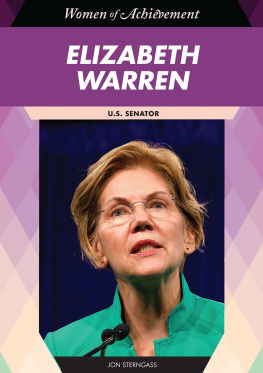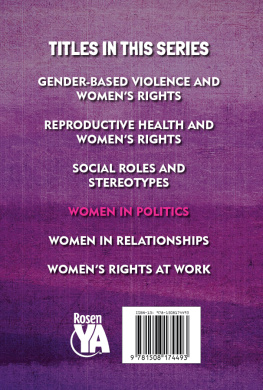Jon Sterngass - Elizabeth Warren: U.S. Senator
Here you can read online Jon Sterngass - Elizabeth Warren: U.S. Senator full text of the book (entire story) in english for free. Download pdf and epub, get meaning, cover and reviews about this ebook. year: 2021, publisher: Infobase Publishing, genre: Politics. Description of the work, (preface) as well as reviews are available. Best literature library LitArk.com created for fans of good reading and offers a wide selection of genres:
Romance novel
Science fiction
Adventure
Detective
Science
History
Home and family
Prose
Art
Politics
Computer
Non-fiction
Religion
Business
Children
Humor
Choose a favorite category and find really read worthwhile books. Enjoy immersion in the world of imagination, feel the emotions of the characters or learn something new for yourself, make an fascinating discovery.
- Book:Elizabeth Warren: U.S. Senator
- Author:
- Publisher:Infobase Publishing
- Genre:
- Year:2021
- Rating:4 / 5
- Favourites:Add to favourites
- Your mark:
- 80
- 1
- 2
- 3
- 4
- 5
Elizabeth Warren: U.S. Senator: summary, description and annotation
We offer to read an annotation, description, summary or preface (depends on what the author of the book "Elizabeth Warren: U.S. Senator" wrote himself). If you haven't found the necessary information about the book — write in the comments, we will try to find it.
Elizabeth Herring Warrens rise to become one of the most powerful women in the United States did not come easily. She grew up lower-middle class in Oklahoma, dropped out of college, married at age 19, and had her first child at 22. A divorce fol
Elizabeth Warren: U.S. Senator — read online for free the complete book (whole text) full work
Below is the text of the book, divided by pages. System saving the place of the last page read, allows you to conveniently read the book "Elizabeth Warren: U.S. Senator" online for free, without having to search again every time where you left off. Put a bookmark, and you can go to the page where you finished reading at any time.
Font size:
Interval:
Bookmark:

Copyright 2021 by Infobase
All rights reserved. No part of this publication may be reproduced or utilized in any form or by any means, electronic or mechanical, including photocopying, recording, or by any information storage or retrieval systems, without permission in writing from the publisher. For more information, contact:
Chelsea House
An imprint of Infobase
132 West 31st Street
New York NY 10001
ISBN 978-1-64693-771-4
You can find Chelsea House on the World Wide Web
at http://www.infobase.com
Perhaps nothing sums up Elizabeth Warren's life, career, and influence as much as a singular incident in February 2017. President Donald Trump had nominated Alabama Senator Jeff Sessions for the position of U.S. attorney general. Warren, the Democratic U.S. Senator from Massachusetts, strongly opposed Sessions's nomination.
In 1986, a Republican-controlled Judiciary Committee had rejected Sessions's appointment to a federal judgeship when four lawyers reported that Sessions had made racially offensive statements. By rejecting Sessions in 1986, Warren said that "the Senate affirmed that there can be no compromise with racism; no negotiation with hate."
Now President Trump had nominated Sessions to an even more powerful post. Elizabeth Warren was irate. She believed that Sessions had a long record of opposing voting rights. During the confirmation debate in the Senate, Warren quoted from a letter from Coretta Scott King (Martin Luther King Jr.'s widow) to South Carolina Senator Strom Thurmond in 1986. Coretta King wrote, "Mr. Sessions has used the awesome power of his office to chill the free exercise of the vote by black citizens in the district he now seeks to serve as a federal judge. This simply cannot be allowed to happen."
Senate Republicans in 2017 voted that by reading the letter from Coretta King, Elizabeth Warren had violated the rarely-used Senate Rule 19. This rule prohibits any Senator from saying anything that would "impute to another Senator or to other Senators any conduct or motive unworthy or unbecoming a Senator." After a party line vote, Republicans prohibited Warren from further participating in the debate on Sessions's nomination.
"I am surprised that the words of Coretta Scott King are not suitable for debate in the United States Senate," Warren said. Instead, she later read King's letter while streaming live online. "They can shut me up," she responded, "but they can't change the truth."
Explaining the Senate's action to silence Warren, Senate Majority Leader Mitch McConnell explained, "She was warned. She was given an explanation. Nevertheless, she persisted." McConnell's statement and the restrictions on Warren's right to speak attracted widespread media attention, ironically far more than Warren's original speech achieved.
The move completely backfired on Senate Republicans. Far from being a rebuke, Warren and her supporters gleefully took up McConnell's quotation as a compliment. The incident went viral on Twitter and thousands rewatched it on the Internet. The phrase "Nevertheless, she persisted" became a popular expression adopted by the feminist movement, emblazoned on mugs, tee shirts, posters, and refrigerator magnets. Warren even titled her 2021 book Persist. She had done it all her life, and she saw no reason to change now.
Elizabeth Herring Warren's rise to become one of the most powerful women in the United States did not come easily or via a traditional road. She was not born into privilege. Instead, she grew up lower middle class in Oklahoma. She dropped out of college, giving up a full scholarship to marry Jim Warren at age 19. She followed her husband to Texas and transferred to the University of Houston, a commuter school at the time. Elizabeth began attending Rutgers Law School when her first child was born when she was 22 years old. Shortly after she graduated law school, another child was born. A divorce followed and she had become a single mother with all the difficulties that role entailed.
Yet she persisted. Early marriage and motherhood did not put her dreams out of reach. She eventually rose to teach law at several universities, including the University of Texas at Austin, the University of Pennsylvania, and Harvard University. She published in many fields, but she specialized in bankruptcy and commercial law. Starting in 1979, Warren began influential research that would alter people's understanding of the causes of personal bankruptcy.
In the 2000s, Warren made the transition from Harvard law professor to effective policy activist. The Consumer Financial Protection Bureau (CFPB), a key part of the 2010 Dodd-Frank financial reform, was her idea. Warren designed the CFPB to prevent financial institutions from selling or advertising deceptive or illegal products. In just 10 years of existence, the CFPB fielded more than 2 million complaints.
From 2008 to 2010, she struggled mightily to prevent the $700 billion appropriated by Congress in the Troubled Asset Relief Program (TARP) from going to banks instead of everyday Americans. Warren argued that taxpayers' money had bailed out the big financial institutions but Congress had not demanded any accountability for the money and did not even know how the bailout money was used. By constantly pounding away at the issue, Warren managed to make accountability a national concern.
Her political career began in 2012, when she defeated incumbent Republican Scott Brown and became the first female U.S. senator from Massachusetts. She won reelection by a wide margin in 2018. As a Senator, she railed against greedy bankers and the corrupt financial industry.
On the Senate Banking Committee, Warren has developed a fearsome reputation for incisive questioning of both Republicans and Democrats. Some of her most electric moments have been confronting powerful financial figures, such as Secretary of the Treasury Timothy Geithner or former Federal Reserve Chairman Ben Bernanke, over the government's response to the ongoing problems caused by the financial collapse of 2008. Her interrogations of Wells Fargo C.E.O.s John Stumpf and Timothy Sloan made for must-see internet viewing, and established her reputation as a passionate and plain-speaking champion of economic fairness.
Elizabeth Warren was briefly the front-runner for the Democratic nomination for president in late 2019, but support for her campaign dwindled. After she withdrew from the race in March 2020, she supported Joe Biden in his campaign against Donald Trump.
Senator Warren continues to deliver unapologetic defenses of an activist government. She has called for tougher financial regulation, stronger social programs, and additional government investment in education, infrastructure, and research. "The American Dream is slipping out of reach," she said in one speech, pointing to the growing concentration of income and wealth in the hands of a tiny elite. "The game is rigged," she declared. "It is deliberately, persistently, and aggressively rigged to help the rich and powerful get richer and more powerful."

Elizabeth Warren supports Medicare for All in 2017.
Source: U.S. Senate
As a politician, Elizabeth Warren presents herself as a voice of the progressive wing of the Democratic Party. Many of her proposals involve big plans to use the federal government to remake U.S. society. Her suggested wealth tax aimed to reduce the power of the top one percent, that she believes is corrupting the country. She has supported great changes in U.S. society, including government health care, free public college, student debt cancellation, breaking up Big Tech corporations, and child care for everyone.
Font size:
Interval:
Bookmark:
Similar books «Elizabeth Warren: U.S. Senator»
Look at similar books to Elizabeth Warren: U.S. Senator. We have selected literature similar in name and meaning in the hope of providing readers with more options to find new, interesting, not yet read works.
Discussion, reviews of the book Elizabeth Warren: U.S. Senator and just readers' own opinions. Leave your comments, write what you think about the work, its meaning or the main characters. Specify what exactly you liked and what you didn't like, and why you think so.












